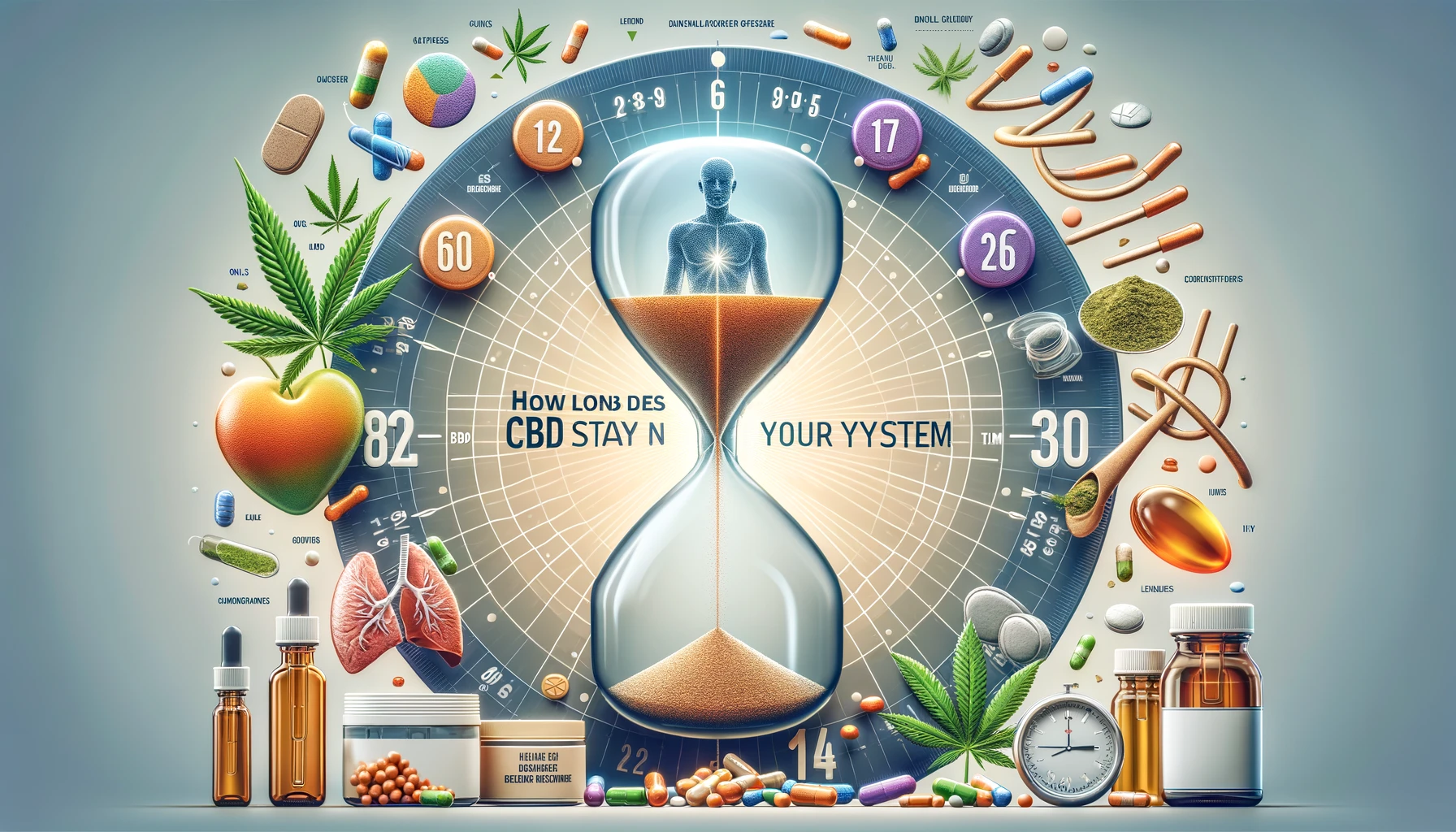Cannabidiol (CBD), a naturally occurring compound found in cannabis plants, has garnered increasing attention and usage due to its potential therapeutic benefits. These benefits range from alleviating chronic pain and anxiety to aiding sleep and potentially offering neuroprotective properties. As CBD becomes more integrated into health and wellness routines, understanding its dynamics within the human body is crucial. A critical aspect of this understanding is knowing how long CBD stays in the system, which is vital for users concerned with drug testing, dosing schedules, and potential interactions with other medications.
2. Understanding CBD
What is CBD?
CBD is one of over a hundred cannabinoids found in cannabis plants. Unlike its more famous counterpart, Tetrahydrocannabinol (THC), CBD is non-psychoactive, meaning it does not produce the ‘high’ associated with cannabis. This quality makes it an appealing option for those seeking relief from pain and other symptoms without the mind-altering effects of marijuana or certain pharmaceutical drugs.
How CBD Works in the Body
CBD exerts its effects primarily by interacting with the endocannabinoid system (ECS) in the human body. This system plays a critical role in regulating a variety of physiological and cognitive processes, including pain sensation, mood, appetite, and memory. CBD influences the ECS indirectly, which may result in the modulation of pain, inflammation, and anxiety, among other effects.
3. Factors Influencing CBD Duration in the Body
The duration for which CBD remains detectable in the body depends on several factors. These include:
- Dosage and Concentration: Higher doses or concentrations of CBD might lead to a longer presence in the body.
- Method of Consumption: CBD can be ingested, inhaled, applied topically, or taken sublingually (under the tongue), with each method impacting absorption rates and duration differently.
- Individual Metabolism: Factors like age, body weight, overall health, and individual metabolic rate play significant roles in how quickly CBD is processed and eliminated from the body.
- Frequency of Use: Frequent use can lead to CBD accumulating in the body, which may extend its detectability.
4. CBD and Drug Testing
CBD itself is not typically screened in standard drug tests. However, many CBD products, especially full-spectrum varieties, contain trace amounts of THC. This could potentially lead to positive results in a drug test, particularly if the products are used regularly or in large amounts.
Understanding Different Types of Drug Tests
There are several types of drug tests, each with different sensitivities and detection windows. These include:
- Urine Tests: The most common form of drug testing, which can detect THC metabolites for days to weeks after use.
- Blood Tests: Less common and used to detect current impairment; THC is detectable in the blood for a shorter period compared to urine.
- Saliva Tests: Increasingly used for roadside testing; detect THC for a shorter duration than urine tests.
- Hair Tests: Can detect drug use over a more extended period, typically up to 90 days.
5. Average Duration of CBD in Different Systems
The detectability of CBD varies depending on the testing method used:
- Bloodstream: Typically, CBD is detectable in the blood for up to several days after use.
- Urine: In urine, CBD can be detected for up to two weeks in some cases, especially with frequent use.
- Saliva: Saliva tests can detect CBD for a few days post-use.
- Hair: Hair tests have the most extended detection window, potentially finding traces of CBD for several months.
6. The Role of Metabolism in CBD Absorption and Excretion
Metabolism significantly affects how long CBD stays in your system. The process of metabolizing and eliminating CBD from the body is complex and influenced by various factors, including genetic makeup, lifestyle, diet, and liver function. The liver plays a crucial role in breaking down CBD, and variations in liver health and enzymes can lead to differences in how quickly CBD is metabolized.
7. Impact of Different Consumption Methods
The way CBD is consumed greatly influences how long it remains detectable in the body:
- Oral Consumption: Ingesting CBD through edibles or capsules results in delayed onset of effects as CBD passes through the digestive system, leading to longer duration in the body.
- Inhalation: Inhaling CBD through smoking or vaping allows for rapid absorption into the bloodstream, but the duration in the system is generally shorter.
- Topical Application: Applying CBD topically generally results in localized effects, and CBD is not typically absorbed into the bloodstream, thus having a limited systemic duration.
- Sublingual Administration: Placing CBD oil or tinctures under the tongue allows for direct absorption into the bloodstream, providing a quick onset of effects and moderate duration in the system.
8. CBD Accumulation and Long-Term Use
Regular, long-term use of CBD can lead to its accumulation in the body’s fatty tissues. Over time, this accumulation could potentially affect the duration CBD remains active and detectable. This factor is particularly significant for individuals using CBD for chronic conditions or those who are subject to regular drug testing.
9. Tips for Clearing CBD from Your System
For individuals needing to clear CBD from their system—for reasons such as drug tests or medical procedures—certain measures can be taken:
- Hydration: Drinking plenty of water may help expedite the elimination of CBD and its metabolites from the body.
- Diet and Exercise: A healthy diet rich in fiber and regular physical activity can enhance metabolism, potentially aiding in the faster processing and elimination of CBD.
- Ceasing Use: The most straightforward method to clear CBD from the system is to temporarily stop its use.
10. Conclusion
The duration CBD stays in the body is influenced by a myriad of factors, ranging from the mode of consumption to individual metabolic differences. Users should consider these factors, particularly in contexts such as drug testing or when managing specific health conditions with CBD.
11. FAQs
- How long does it take for CBD to leave the system?
- The duration varies depending on factors like dosage, consumption method, and individual metabolism. Generally, CBD can stay in the body for days to weeks.
- Can CBD cause a positive drug test?
- Pure CBD is unlikely to result in a positive drug test. However, full-spectrum CBD products containing THC might lead to positive results, especially with high doses or prolonged use.
- Does the method of CBD consumption affect its duration in the body?
- Yes. Methods like oral ingestion generally lead to longer duration in the body, while inhalation results in a shorter duration.
- Is it possible to speed up the elimination of CBD from the body?
- Hydration, diet, exercise, and ceasing use can help in reducing the duration CBD stays in the system.
- Does regular use of CBD affect how long it stays in the body?
- Regular, long-term use can lead to the accumulation of CBD in the body, potentially extending its duration in the system.

Meet the CBDOilWow Editorial Team, a collective of CBD experts dedicated to unraveling the world of cannabidiol. With a passion for wellness and a commitment to providing the latest insights, they serve as your trusted guides in exploring the potential of CBD, ensuring you make informed choices for a healthier, more balanced life.

Leave a Reply